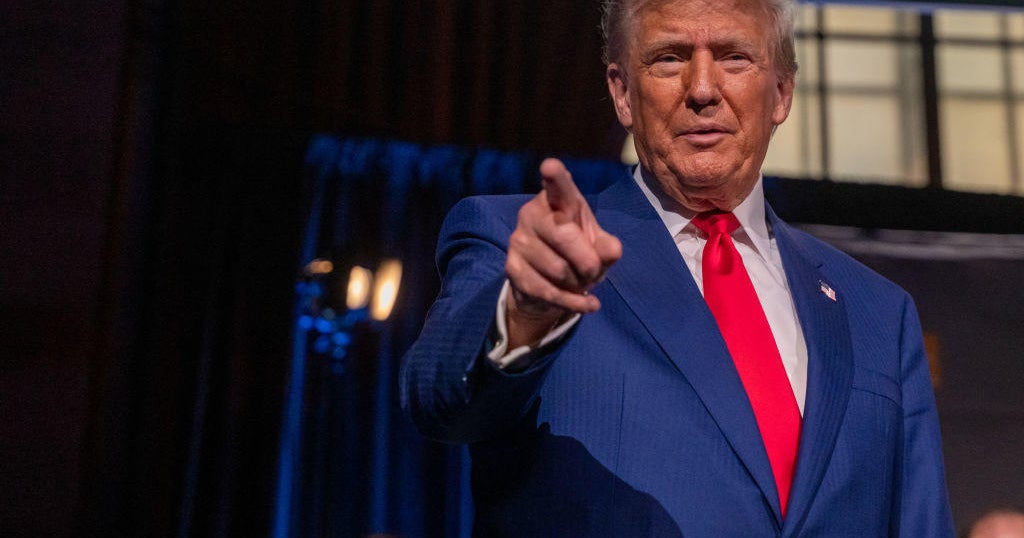Star Tribune
Some Somali voters say economy, social issues are driving them to vote for Trump

Salman Fiqy arrived in Minnesota on a historic day: Jan. 20, 2009, when Barack Obama took office as president. Fiqy, then 19, was excited. “I was a Democrat,” he said.
That changed through the years, as the Somali immigrant earned a biology degree from Minnesota State University, Mankato, pursued a career in medical consulting and started a family. By the time Donald Trump was president, Fiqy had become conservative.
Fiqy, now 35 and living in Burnsville, said he believes that trend is gaining traction in his community. That’s because, he said, Somalis in Minnesota are becoming increasingly middle class. And as Muslims, they’re already culturally conservative.
Many Muslim voters are also fed up with Democrats taking their support for granted, he said. “If you speak to the Muslim community now, they say, ‘This time, I can try conservative,'” Fiqy said.
A day after President Joe Biden’s faltering performance in the June 27 debate, several East African patrons at 24 Somali Mall in south Minneapolis expressed support for Trump in his campaign to return to the the White House.
Many said they’re willing to look past the former president’s previous anti-Muslim rhetoric and temporary ban on travel from six Muslim-majority countries, including Somalia, during his administration. Immigration from Somalia plunged while Trump was in office, when the United States went from granting 1,797 visas to Somali immigrants in 2016 to 464 in 2019.
Voters of color abandoning Democrats in favor of Republican candidates has become a trend, but political scientists offer several caveats. The shift has been marginal, according to University of Minnesota Prof. Christopher Federico, and doesn’t apply to women.
On a recent Friday at the Five Star Barbershop, owner Yasin Ali said his business has been slow for the past few years. “I will vote for Trump because of the economy,” he said. “Two times I voted Democrat. This will be my first time voting Republican.”
Sabiq Hirsi, a 26-year-old truck driver, said he plans to vote for Trump. Business has slumped and gas prices have spiked in the past few years, hurting his bottom line, he said. He said he also opposes sending U.S. aid to Israel in support of its war against Hamas and to Ukraine in its war with Russia.
“Biden is spending billions on wars,” he said. “War wasn’t as crazy when Trump was president.”
Hirsi said he is not persuaded by arguments that the Republican nominee’s harsh rhetoric on immigration and other topics amounts to racism.
“They convinced me the first time when he was running that Trump is a racist and he hates us,” Hirsi said. “Actually, Democrats are bad for the country.”
But he said it’s not just economic issues that are driving his support for the former president. Several Muslim parents have protested LGBTQ policies and books at Twin Cities schools, and Hirsi said he’s concerned about what his two young sons are being taught in the classroom.
“We really don’t have freedom of religion,” he said. “I’m opposed to transgender and LGBT stuff.”
Fiqy, who has two school-age sons, also opposes LGBTQ and gender identity curriculums in the public schools.
“The idea that you can have a different sexual orientation — we feel it is too early for our kids to be indoctrinated with that kind of education,” he said. “They can make a decision later on in their life when they are sound.
“As Muslims, we have always had conservative values, and we’ve been all along preaching conservative values that are similar to the Republican Party.”
Fiqy said he believes that the changing demographics are prompting more in the Somali community to vote Republican. The first Somali immigrants who arrived in Minnesota in the 1990s were refugees, he said, and voted Democratic because they believed the party represented their values. But as their kids grew up and moved up the economic ladder, pro-business perspectives became more attractive to them, he said.
“The next generation is middle class,” Fiqy said. “Their perception has changed because of their economic status, and that plays an important role.”
There’s the question of whether Trump’s harsh rhetoric on immigration harms his appeal to Somalis. During a 2019 rally in Minneapolis, Trump condemned the legacy of Somali refugee resettlement in Minnesota and banned travel by Muslims to the U.S.
“He’s very racist,” said Gulad Abdi, a regular mall patron, who said he plans to vote for Biden this fall — though he expressed concern about the president’s debate performance. “As a Democrat, I want them to find a new candidate,” he said.
Abdi Mohamed, another regular at the mall, said he will vote for Biden. “The other guy is a lunatic,” he said, adding that he doesn’t see support for Trump or Republicans growing among Somali voters.
Some Somali voters said they’re willing to look past Trump’s anti-immigration rhetoric. Fatumo Nur voted for Trump in 2016 and Biden in 2020 but plans to vote for the Republican again this fall. He’s “noisy,” she said of Trump, but “not a bad guy.”
Imam Abdirisak Duale, a longtime Republican activist from East Grand Forks, Minn., called Trump’s previous remarks about Somalis “unfortunate and divisive.”
“While I may not agree with everything he says, I support many of his policies that prioritize national security, economic growth and religious freedom,” Duale said. “It is important to look at the overall impact of his policies.”
About the partnership
This story comes to you from Sahan Journal, a nonprofit newsroom dedicated to covering Minnesota’s immigrants and communities of color. Sign up for a free newsletter to receive Sahan’s stories in your inbox.
Star Tribune
Gov. Tim Walz Stops in Erie, Pa. for Second Day of Vice President Campaign
Governor Walz visits swing state Pennsylvania in second day of solo Vice Presidential Campaign
Read the original article
Star Tribune
East Phillips environmental activists get last minute funding deadline extension to buy Roof Depot

Just one week before the final deadline for East Phillips environmental activists to come up with $11.4 million to buy a city-owned warehouse for their vision of an indoor urban farm, the Minneapolis City Council on Thursday granted the activists a one-year extension to get the funding.
It’s the latest twist in the long fight of East Phillips Neighborhood Institute (EPNI) to gain control of the former Roof Depot warehouse at E. 28th Street and Longfellow Avenue.
For a decade, neighborhood activists have opposed the city’s plans to build a Public Works yard for water maintenance staff, equipment and diesel vehicles — something that city staff said would benefit Minneapolis as a whole despite concentrating more air pollution in the heavily industrialized, working class East Phillips neighborhood.
Council Member Jason Chavez, who represents East Phillips, and his council predecessor Alondra Cano have long opposed building a municipal water yard in the Ninth Ward, while other council members have waffled on the thorny issue.
On Thursday, Chavez won the unanimous support of his colleagues at the City Council meeting for a resolution to extend the funding deadline to September 2025 for EPNI, which was unlikely to come up with the money by the previous deadline of next week.
“This item today that I am bringing forward is a collaborative effort with the mayor’s administration, City Council, staff and the community I represent to find a viable pathway forward, and it shows what we can do when we all work together,” Chavez said.
“I’m proud of the tenacity of East Phillips neighbors, their persistence on human rights and advocacy for clean air. It’s one of the reasons why Ward Nine continues to be hopeful for the future.”
After years of protests and lawsuits, Minneapolis officials gave up on plans to build a water yard at Roof Depot and agreed to sell EPNI the property, provided the group produced a $3.7 million personal guaranty and the Legislature provided $2 million in 2023 followed by $5.7 million in 2024. The Legislature also has committed $4.5 million to Minneapolis to find a new site for its water yard.
Star Tribune
Mesabi Metallics wins small victory with judge allowing its antitrust claims against Cleveland-Cliffs to go to trial

But in a Wednesday filing, Goldblatt denied Cliffs’ motion for summary judgement, saying there are enough factual disputes to merit a trial in federal district court.
“A (reasonable) jury could find that Mesabi suffered the type of injury that antirust law is intended to prevent,” he wrote.
From 2015 to 2019, Cleveland-Cliffs was by far the largest independent iron ore merchant for the Great Lakes steel business with 73% to 78% of the “non-captive” market for taconite pellets, Mesabi claims. The term “captive” refers to iron mines owned directly by steel companies. In 2020, Cliffs bought two major U.S. steelmakers and now primarily produces iron ore for its own “captive” steel mills.
The Nashwauk plant would have competed with Cliffs in the non-captive market. Essar Minnesota made a critical deal in 2014 to supply taconite pellets to ArcelorMittal’s U.S. subsidiary, then one of the nation’s two largest steelmakers. But ArcelorMittal terminated the contract in 2016 since Essar Minnesota had yet to finish its Nashwauk plant.
Cliffs then signed a 10-year agreement with ArcelorMittal. Mesabi Metallics claims Cliffs structured the contract to give Cliffs exclusive access to Arcelor and shut Mesabi out of the market.
Mesabi Metallics also claims Cliffs’ anticompetitive conduct included blackballing construction contractors who worked on Mesabi’s project. The Jamar Co. and Barr Engineering, two Minnesota prominent contractors, had worked for both Mesabi and Cliffs. Cliffs refused to let Jamar continue to work on ongoing projects – or bid on new ones, Goldblatt’s ruling said. Once Jamar stopped supporting Mesabi, it got its Cliffs business back. A similar tale unfolded with Barr.




